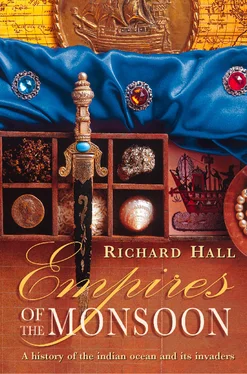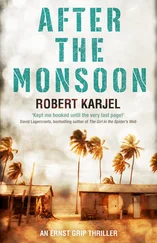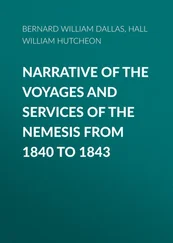Such facts as the Portuguese had collected about the country were fragmentary enough to let them cling to the Mandeville fantasies of Prester John’s invincibility: ‘This emperor, when he goes into battle against any other lord, has no banners borne before him; but he has three large crosses of gold full of precious stones; and each cross is set in a chariot richly arrayed. And to keep each cross are appointed ten thousand men of arms and more than one hundred thousand footmen.’
Undeterred by the dangers, several Franciscan missionaries now managed to reach Ethiopia and make their way to the king’s court. Although one Venetian friar who wrote an account of the trip felt obliged to talk of ‘the great king Prester John’, his opinion of Ethiopia was decidedly low:
This country has much gold, little grain, and lacks wine; it has a very large population, a brutish people, rough and uncultured. They have no steel weapons for combat. Their arrows and spears are of cane. The king would not take the field with a force of less than 200,000 or 300,000 people. Each year he fights for the faith. He does not pay any of those who take the field, but he provides their living and exempts these warriors from every royal taxation. And all these warriors are chosen, inscribed and branded on the arm with the royal seal. No one wears woollen clothes because they have none, but instead they wear linen. All, both men and women, go naked from the waist upwards and barefoot; they are always full of lice. They are a weak people with little energy or application, but proud.
Had he read them, these contemptuous judgements would have enraged Zara-Yacob, the most powerful Ethiopian ruler in the fifteenth century, since he was expanding his domains by driving the Muslims back towards the Red Sea. Zara-Yacob was also brandishing at Egypt the wildly improbable but oft-repeated threat that he would divert the course of the Blue Nile. In a letter to Cairo in 1443, he warned Sultan Jamaq that he could do so at that very instant; only his fear of God and reluctance to cause human suffering held him back.
Zara-Yacob was annoyed on hearing that Europeans were calling him Prester John, remarking that he had a perfectly good name already, meaning ‘Seed of Jacob’. The emperor also conceded nothing in terms of piety: his subjects were ordered to have the renunciation of the devil tattooed on their forehead, and any who demurred were beheaded.
How much the Portuguese knew of such matters is uncertain. There was quite enough to convince them, however, that Prester John really did exist The exact position of his Ethiopian kingdom remained obscure, but it would surely be a place of succour on the way to India. All caravel captains had orders to seek news of this Christian king wherever they stepped ashore in Africa. Since on Brother Mauro’s map almost all of the continent had been delineated as Ethiopia, dotted with imaginary cities and fanciful drawings, the court in Lisbon started thinking of ways to collect more precise information.
SIXTEEN
The Spy Who Never Came Home
So geographers, in Afric maps,
With savage pictures fill their gaps,
And o’er unhabitable downs,
Place elephants for want of towns.
—Jonathan Swift, ‘On Poetry, a Rhapsody’ (1733)
DURING THE AUTUMN OF 1487, two Moroccan merchants lay ill with fever in the Egyptian port of Alexandria. Their deaths seemed so certain that the city governor did not bother to wait on the event, but exercised his right to confiscate their possessions. To his dismay the Moroccans recovered. They reclaimed their goods, including numerous jars of Neapolitan honey, then hurried off to Cairo.
This had been an unpromising start to what was to become one of the most spectacular feats in the history of espionage. The two men were neither Moroccans nor merchants, but agents of the Portuguese government. Their orders were to spy out the ports of the Indian Ocean, investigate the routes by which pepper and other spices reached the Mediterranean, and make contact with ‘Prester John’, ruler of Ethiopia. The senior of the two agents, named Pêro de Covilham (sometimes written Covilhã or Covilhão), had been given a chart on which he was ordered to note down everything the two managed to learn about navigation in the Indian Ocean. 1In particular, he had been told to find out whatever the Arab and Indian sea-captains might know about a route round the southern tip of Africa.
On the day of their departure, Covilham and his companion, Afonso de Paiva, had been assured by the Portuguese king, John II, that he knew they were embarking on a ‘difficult mission’. This was an understatement. Although both spoke Arabic, were using Muslim names, and had assumed the appearance of itinerant merchants, the price of having their identities discovered would almost certainly be death; the best they could hope for, if they were found out, would be enslavement. To ensure they had perfected their new roles they took time over the journey from Portugal to Egypt, by way of Valencia, Barcelona. Naples and Rhodes, where they boarded a ship for Alexandria with their jars of honey.
From that moment on there was no way of sending messages back to Lisbon, other than risking the use of a slow and uncertain courier system maintained between Jewish merchants in Europe and their compatriots in the lands of the East. There was a large Jewish community in Cairo, which had been the foremost city in the Muslim world until Constantinople was captured by the Turks some thirty-five years earlier; it was to Cairo that Covilham and Paiva planned to return when their work was complete. Now their aim was to travel up the Nile, cross to the Red Sea with a trading caravan, then take a boat down to Aden at the entrance to the Indian Ocean.
Selling honey as they went, they reached Aden safely in August 1488, and there agreed to part. They would never see one another again, and neither would return to Portugal. Paiva crossed over to the port of Zeila on the African mainland, to make his way into Ethiopia. This was a hazardous route for a Christian disguised as a Muslim, since it went through territory occupied by the Arab armies who were confronting the Ethiopians in their mountain fastnesses.
Now on his own, Covilham booked his place in one of the hundreds of small Arab dhows leaving at that season from Aden to India, with the south-west monsoon in their sails. This was to be the first of a series of journeys that would last more than two years, as Covilham repeatedly criss-crossed the Indian Ocean, furtively making notes on the chart he kept in his baggage.
Behind him lay a career in espionage and diplomacy which made him a natural choice for such a venture. By now in his late thirties, he had risen from poverty to be a knight in the royal household. His birthplace, from which he took his name, was the mountain town of Covilham, close to the border with Spain. In his youth he had served in the court of the Castilian duke of Medina Sidonia, but returned to Portugal in 1474. A natural linguist, he accompanied King Afonso V on a visit to France, and so impressed his superiors that he was sent back to France on his first espionage mission. One of his contemporaries described him as ‘a man of great wit and intelligence’, and a vivid raconteur. Covilham was taken up by John II, who sent him to Morocco as an ambassador. There his task was to negotiate with the sultan of Fez for the return to Portugal of the bones of the ‘martyr’ Prince Fernando, who had died in a Moroccan dungeon after being captured at Tangier in 1437. This spell in Morocco allowed Covilham to master Arabic and study the Islamic way of life.
What had especially endeared Covilham to the new king was the work he next carried out; he was sent to Castile to keep an eye on the activities of the fugitive Braganza family. 2As a chronicler put it, John II wanted Covilham to ‘spie out who were those gentlemen of his subjects which practised there against him’. The hatreds around the throne at the time were intense, for the king had ordered the execution of his cousin the Duke of Braganza for plotting, and had personally stabbed to death another disloyal duke, notwithstanding that he was the queen’s brother. Amid this royal blood-letting, Covilham always stayed true to the king.
Читать дальше












